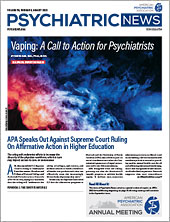The issue of intimate relationship between a psychiatrist and the psychiatrist’s patient is like the proverbial nine-headed Hydra that keeps re-emerging and cannot be completely eradicated. Even though it is now common knowledge, nay, a commandment of some sort—Thou shall not sleep with your patient—scenarios continue to emerge and challenge this now concretized prohibition.
A psychiatrist recently told me a conundrum with which she was confronted. Her patient informed her that she was having an affair with her former psychiatrist. The two had terminated treatment so they could commence an intimate relationship. When the psychiatrist informed her patient that her former psychiatrist’s behavior was unethical as the inherent power differential between the patient and her psychiatrist placed her in a vulnerable position exploited by her psychiatrist for his own gratification, the patient’s response stunned the psychiatrist. The patient accused the psychiatrist, and by extension APA, of stripping her of her rights. She proposed that an adult patient with a sound mind had the right to make an informed decision regarding whom to date.
The psychiatrist’s otherwise ironclad stance against intimate relationships with patients was swayed. Referencing the current and powerful patients’ rights movement that has swung the pendulum of decision-making regarding medical care far in the patients’ corner, she wondered if our profession was not infantilizing patients with our blanket paternalistic view regarding relationship between a former psychiatrist and a patient. Perhaps, she continued, APA should align its ethics with the
AMA Code of Medical Ethics Opinion 9.1.1, which supports an intimate relationship in certain circumstances: “A physician must terminate the patient-physician relationship before initiating a dating, romantic, or sexual relationship with a patient.” Further, the
World Psychiatric Association (WPA) Code of Ethics (2020) reflects the AMA ethics code, stating that “They [psychiatrists] abstain from sexual relationships with their patients or their patients’ family members and avoid exploiting patients to meet their own or others’ financial, social, emotional, or other needs.” These two ethics codes, she noted, were silent on sex with a former psychiatrist/physician.
In another case, a forensic psychiatrist who conducted a psychiatric evaluation on a defendant in a civil case began a sexual relationship with the defendant months after the end of the civil case. The psychiatrist, supported by the defendant, justified the intimate relationship on the grounds that he did not have a doctor-patient treatment relationship with the patient and, therefore, was exempt from the ethics injunction.
These two case scenarios, and many others the Ethics Committee encounters from time to time, highlight the ongoing challenges to the APA ethics guidance against sex with current or former patients or with patients’ relatives and close friends. While APA’s ethics prohibition might appear extreme, it is not without justification.
In the first case in which a patient bemoaned her loss of autonomy and right to decide whom to date, the patient did not fully appreciate the unique power differential that favored the psychiatrist by virtue of his knowledge of the patient’s sensitive information obtained through therapy. Such information could be used to exploit, manipulate, and influence the patient during their romantic relationship well after their treatment relationship ends, as highlighted by Section 2 of the APA ethics code. While the psychiatrist had privileged information about the patient, it was not reciprocal as the patient had limited information about the psychiatrist. The
APA Commentary on Ethics in Practice Topic 3.2.6 further notes that even the possibility of a future sexual or romantic relationship may contaminate current clinical treatment. Likewise, any occasion in which the physician interacts with a current or former patient in a way that may be a prelude to a more intimate relationship should be avoided.
Interestingly, the psychiatrist preference for the AMA’s Code of Medical Ethics Opinion 9.1.1 in these situations was misguided, as the AMA code continued with a warning, “[S]exual or romantic relationships between a physician and a former patient may be unduly influenced by the previous physician-patient relationship … and are unethical if the physician uses or exploits trust, knowledge, emotions, or influence derived from the previous professional relationship, or if a romantic relationship would otherwise foreseeably harm the individual.”
In terms of a romantic relationship with a forensic evaluee, interest in an intimate relationship with the evaluee is likely to impair the psychiatrist’s ability to strive for an honest and objective opinion, thereby introducing bias in the assessment, which is unethical. In addition, the comprehensive and voluminous information obtained by the psychiatrist about the defendant in a legal situation creates a similar power differential dynamic discussed earlier and places the defendant in a vulnerable position. Furthermore, the psychiatrist may be invited to opine on the case in the future, as legal cases often resurface, thereby highlighting the need for vigilance and avoidance of boundary violations in forensic evaluations.
In conclusion, health care delivery, including the relationship between patients and psychiatrists, will continue to evolve as society evolves, creating new scenarios that will challenge the relationship. Regardless of the context, the core element of the relationship should always revolve around what is in the best interest of the patient, current or former, and not the psychiatrist. Therefore, sex between a former patient and a psychiatrist, a gratuitous act for the psychiatrist, remains problematic and unethical. ■

